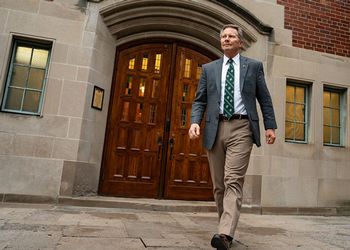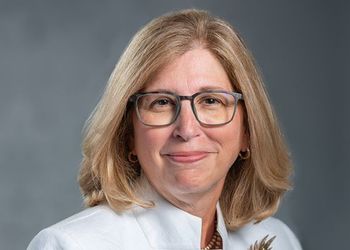Feature: A Renaissance of Jewish Studies at MSU

The recent rise of Jewish Studies at MSU, led by creative faculty, was enabled by university leadership with foresight, along with energetic support from alumni donors and the Michigan Jewish community.
Just 20 years ago at MSU, there was no Hebrew instruction. There was no serious study of Israel as a state and society. MSU did not have a Jewish Studies Program offering an undergraduate specialization; there was no faculty-led study abroad in Israel. No faculty were part of an interdisciplinary initiative to study Jewish civilization: a few relevant courses existed but these were not enough to comprise a serious program. No scholarships were available to support student study in Israel. There was no active calendar of lectures or events on Jewish subjects or issues. No annual Holocaust lecture existed; no MSU Israeli film festival existed.
How things have changed! With the endorsement of leading administrators at MSU, including former president Peter McPherson and President Lou Anna K. Simon, and with generous help from alumni donors and others in the Michigan Jewish community, MSU has created a substantial program which is having an impact at the university, in the state and even nationally.
That’s one reason the Detroit Jewish News recently called MSU “A Good Place to be Jewish” (Sept. 4, 2013).
MSU students can currently study Hebrew through the intermediate level. They can study Israel as a modern state and society and culture as well as a core participant in the ongoing Israel-Arab conflict. They can study Jewish history in Europe and America, the Holocaust, Judaism, Jewish literature and thought, and more.
Ken Waltzer, director of the Jewish Studies Program, notes that JSP counts seven core faculty members and another 11 affiliated faculty spread in six colleges. A Michael and Elaine Serling and Friends Chair in Israel Studies has been endowed and filled, only the fifth such Israel Studies chair at an American university. A Michael and Elaine Serling Visiting Israeli Fellows fund has also been created to sponsor visiting faculty to help enrich and augment the curriculum.
Jewish Studies has sponsored a summer study program at Hebrew University’s Rothberg International School since 1998. After a brief period when potential danger in the region curtailed the program, a faculty-led MSU group has been going every year since 2006. JSP also sponsors a Green Israel summer program that studies environmental issues around the country from Kibbutz Lotan in the Negev to Tel Hai College in the Galilee. An endowment gifted by Edward Levy Jr. helps student leaders of all backgrounds cover a good part of the costs of study abroad in Israel. The Israeli Fellows program brings Israeli scholars to MSU—anthropologist Chen Bram from Hebrew University this year. Professor Bram taught James Madison College students on Jewish-Muslim relations and also on Israeli diversity. JSP also has sponsored in recent years visits to MSU by Israeli writers Etgar Keret, Meir Shalev, and Savyon Liebrecht, by Israeli film makers Yael Katzir and Guy Meirson and by Israeli jazz player Omer Avital.
The JSP annual calendar now includes the Stanley and Selma Hollander Lecture in Jewish Art and Music, a Yiddishkeit lecture on Jewish history and language, the George and Esther Kessler Lecture on Jewish Film, the Michael and Elaine Serling Lecture on Modern Israel, and the David and Sarah Rabin Lecture on the Holocaust, which serves as the cornerstone of commemoration activities at MSU. This year, with additional help from Ed Brill, JSP sponsored the 21st annual Rabin Lecture. The leading speaker, Wendy Lower, is the author of Hitler’s Furies, which was a finalist for the National Book Award. JSP also sponsored the Ninth Annual Israeli Film Festival in March with support from campus colleges and departments, community organizations and the Israeli Consulate in Chicago.
Coming Together
All this happened through the remarkable coming together of many forces and interests, says Waltzer. One key was the desire by President McPherson to revitalize Jewish enrollment to the level that existed when he was a student in the 1960s. “McPherson noted that when he attended MSU in the 1960s that there were more Jewish students than later on,” says Waltzer. “As a farm boy from the conservative Grand Rapids area, he thought these classmates served as a special leaven in the mix and hoped MSU could be that way again.”
At the same time, notes Waltzer, many Jewish alumni reflected positively on their experiences at MSU—attorney Michael Serling, from Detroit, whose dormitory buddies called him “Heeb,” for example, remembered how his years at land-grant MSU prepared him for a larger world more complex than the narrower Jewish world from which he had come. Such graduates were enthusiastic MSU followers who continued rooting and cheering for the Spartans and were likely participants in fundraising. But most such alumni had not yet been seriously solicited by MSU, save for the athletic department, to help grow the university. Under these circumstances, says Waltzer, “a Jewish Studies Program could be galvanizing, attracting students to the university from metro Detroit and elsewhere and also possibly attracting potential alumni donors.”
Waltzer also cites the passage of term limits in the Michigan legislature, which would lessen the networked relations built by MSU through county extension with chairs of leading legislative committees. “Here too was a possibility for MSU to connect with a new under-tapped constituency concentrated in southeast Michigan,” says Waltzer. “This group was and is well-organized and successful, and was cross-laced with institutions and news outlets that could say the appropriate word on the university, its accomplishments and its needs.”
Some readers may remember the several years President McPherson went down to Detroit and sat for an interview with the Detroit Jewish News or the subsequent years when President Simon spoke before the Board of the Metropolitan Detroit Jewish Welfare Federation about MSU and the future of Michigan.
Finally, says Waltzer, several faculty at MSU were eager to create a Jewish Studies Program that would better enable them to teach and research in subjects related to Jewish history and culture and also add the study of Jewish life and expressions to the growing multicultural curricular mix. Waltzer notes that the possibility of adding new faculty and new subjects to the MSU curriculum won strong favor among a set of veteran faculty. Barry Gross, the first director of Jewish Studies, who was hired by Dean John Eadie in Arts and Letters, secured two-year support from the Max Fischer Community Foundation through the Detroit Jewish Federation to launch Hebrew instruction at the university. Steve Weiland, the next director, together with Waltzer, then sought additional support from donors to launch an entirely new and more ambitious program that would focus on the enormous transformation in global Jewish life during the past 150 years.
“What had once been central Europe, was now peripheral,”
explains Waltzer. “What had been peripheral—North America and Israel—were now the two centers of Jewish life.”
Waltzer, who became JSP director in 2004, was active in its earlier growth. He remembers a severe dressing down that he and Director Steve Weiland received from alumnus Paul Borman, the executor of the Borman Family Foundation in Southfield, that they should think bigger and more expansively and be prepared to ask more of donors whom they solicited. “It was outside, in the parking lot, directly after this meeting and dressing down, that Weiland and I elaborated on the focus of the original program,” recalls Waltzer. “’Oh yea, we think too small? We’ll show Mr. Borman,’ we said, vowing solemnly to do so.”
The elaboration of the two centers approach told the university exactly what was needed to put the program on the map: new faculty in American Jewish History and in Israel Studies, in Hebrew language and literature, and in Judaism and in Jewish Thought. It also told potential donors in the community exactly what faculty were seeking to build at the university. A handful of new faculty positions could serve as the core faculty for the new expanding program spread across multiple units, and the university wouldn’t have to pay 100 percent for all of it—the community would assist and raise some funds as well.
“That meant that MSU would get a Jewish Studies Program at a discount,” notes Waltzer.
In subsequent years, JSP, housed since its inception in the College of Arts and Letters, worked with several other colleges and numerous departments at MSU to recruit and grow the new core faculty. JSP hired young scholar-teachers in American Jewish History (Kirsten Fermaglich), Hebrew (Marc Bernstein), Israel Studies (Yael Aronoff), and Judaism and Jewish Thought (Benjamin Pollock). These new Jewish Studies positions were sited, respectively, in History, Linguistics and Languages, James Madison College, and Religious Studies. All these new scholars later published books and were active professionally, increasing the program’s visibility among the many other Jewish Studies programs that grew at many other universities during this period. All earned tenure at Michigan State. Waltzer notes that MSU had to fight off offers to hire some of them away from the university.
Benjamin Pollock in particular added to the luster by winning the Salo Baron Prize for the best first book in Jewish Studies for his path-breaking work Franz Rosenzweig and the Systematic Task of Philosophy. At the festivities, the head of the Association for Jewish Studies called the book “the best in a generation in Jewish philosophy.” Ilana Blumberg, an affiliated faculty, also won plaudits for Houses of Study: a Jewish Woman Among Books, which earned the Sami Rohr Choice Award and was runner-up for the National Jewish Book Award in Women’s Studies. Ken Waltzer’s research on the Nazi camp Buchenwald resulted in a memorable discovery of a Holocaust memoir fraud called “Ángel at the Fence,” forcing cancellation of the memoir and of a projected block-buster (but fraudulent) movie. Waltzer’s ongoing work also became the basis for a documentary film, Kinderblock 66: Return to Buchenwald, which has been shown throughout North America and Europe and in Israel and Australia. Yael Aronoff’s new book The Political Psychology of Israeli Prime Ministers: When Hard-liners Opt for Peace is likely also to stir attention; so too will Kirsten Fermaglich’s prospective second book, to be focused on the history of American Jewish name-changing.
JSP Students
Currently some 40-50 MSU students at any one time are engaged in finishing the specialization by completing 20 credits in Jewish Studies courses offered variably in many departments. Clusters of students—Jewish and non-Jewish alike—enroll from Arts and Letters, James Madison College, the College of Social Science, the Broad College, and the Residential College in Arts and Humanities, among others. Pre-med students or students from Lyman Briggs occasionally join the mix. Some 12 to 16 students graduate annually with a Jewish Studies designation on their transcripts. Soon the specialization will be transformed into a minor, as specializations are being phased out at the university.
Students who don’t wish to specialize but just want to take particular courses also contribute to the program. Last semester, 362 students were enrolled in Jewish Studies courses. More than 700 will have completed a Jewish Studies course during the academic year. Moreover, this past summer 32 students traveled to Israel and studied in Jerusalem and between the Negev and the Galilee. Since 2006, nearly 150 MSU students have studied abroad in Israel, most with scholarship support. Most have done so on faculty-led programs but some have enrolled in universities that have relations with MSU—Ben Gurion, Haifa, Hebrew and Tel Aviv. These students study advanced Hebrew or take courses on the Middle East and Jewish history, focus on security and terror studies, or study politics, international relations or conflict management.
One gratifying reality, according to Director Ken Waltzer, is that many JSP students go on to graduate, professional and law school in related fields hoping to help bring peace to the Middle East, to work for strengthened ties between the U.S. and Israel, or to improve social relations and protect minority rights in the U.S. and elsewhere. “Many of them will be the future leaders of the Michigan Jewish community or will become knowledgeable professionals in a range of fields with significant impact on Jewish life, Jewish-non-Jewish relations and more,” says Waltzer.
Several also go on to high-level graduate study in these areas. In recent years, graduates have earned places in leading American programs at Johns Hopkins, Georgetown, Columbia, and NYU, at Brandeis and the University of Michigan, and abroad at Kings College, University of London, the Hebrew University, Tel Aviv University and the Interdisciplinary Center at Herzliya, Israel.
One recent graduate is a Schusterman Fellow at NYU earning a Ph.D. degree in Israel Studies. Another is the Michigan Young Leadership Director of the American Israel Public Affairs Committee (AIPAC). Yet another is a community relations specialist with the American Jewish World Service. Another is the East Coast Regional Manager of the Israel on Campus Coalition. One is in seminary at Hebrew Union College preparing for the rabbinate. A recent graduate who earned a Marshall Fellowship will be studying water policy in the Middle East at Cambridge or Oxford next year. Another graduate, who earned a Fulbright, spent a year at the University of Freiburg in Germany studying postwar trials and exploring postwar justice after the Nazi Holocaust.
Dedicated faculty in Jewish Studies offer students numerous opportunities to do independent studies, research projects, senior honors theses and other projects working with skilled mentors. Fulbright winner Marissa Perry completed an original historical study of prisoner experience in Leipzig-Schönefeld, a Nazi women’s concentration camp, during her undergraduate years. Geoff Levin’s undergraduate study of Israeli unilateralism and the Gaza withdrawal was later published in the journal Israel Affairs. Danni Gittleman recently edited and annotated her late grandfather, Ira Mechlenberg’s, hand-written, unpunctuated memoir of hiding and surviving in rural Poland during World War II and is now seeking a publisher. Other students have done original research on Josephus and the trauma of the Roman triumph in ancient Israel, and on the peace movement in contemporary Israel, on Israeli and American counter-terrorism programs, on Israeli approaches to asymmetric warfare, on LBGT issues in Israel, and on soccer initiatives to promote understanding between Israeli and Palestinian youths.
JSP Support
“None of this was possible without the generosity of many people, including supporters and donors to Jewish Studies over 20 years, and without the efforts of the MSU Jewish Studies Advisory Board, led by Michael Serling,” says Waltzer. “Nor would it have been possible without special support from a series of deans, including Wendy Wilkins and Karin Wurst in Arts and Letters and Sherman Garnett in James Madison College.”
Special contributions to Jewish Studies have come from industrialist Ed Levy Jr, from MSU alumni Albert Ratner in Cleveland and Alan Kaufman in West Bloomfield, from Michael and Mary Levine, Selma Hollander, the late Albert and Beah Rabin, the Kessler Family, Ed and Dot Slade, Ed Brill for his brother Michael and many others. Special ongoing support has also come from members of the Advisory Board, including Sam Bernstein, Irwin Elson, Albert Gladner, Alan Kaufman, the Kirschner family, the late Art Langer, Jeff Leib and others.
MSU hopes that their assistance and that of others will keep the momentum going. JSP is currently looking for a naming gift and for an endowment for the director. The program is also beginning a push as part of the upcoming capital campaign to raise a new endowment for a chair in European History and the Holocaust. No such chair exists in Michigan. Ken Waltzer will also retire next year, and the program will go forward in new and able hands.
Ten years ago, in August 2003, the Detroit Jewish News recognized that MSU was experiencing a “renaissance in Jewish Studies.” This past September, President Simon invited leading members of the Jewish community to Cowles House to highlight the accomplishments and to celebrate the collaboration. The Detroit Jewish News observed there had been a renaissance of Jewish life in general on campus. Among key factors cited were the university’s evolving Jewish Studies program, the simultaneous renaissance of Hillel, and the generosity of local Jewish donors and philanthropists who stepped up to support the university.



